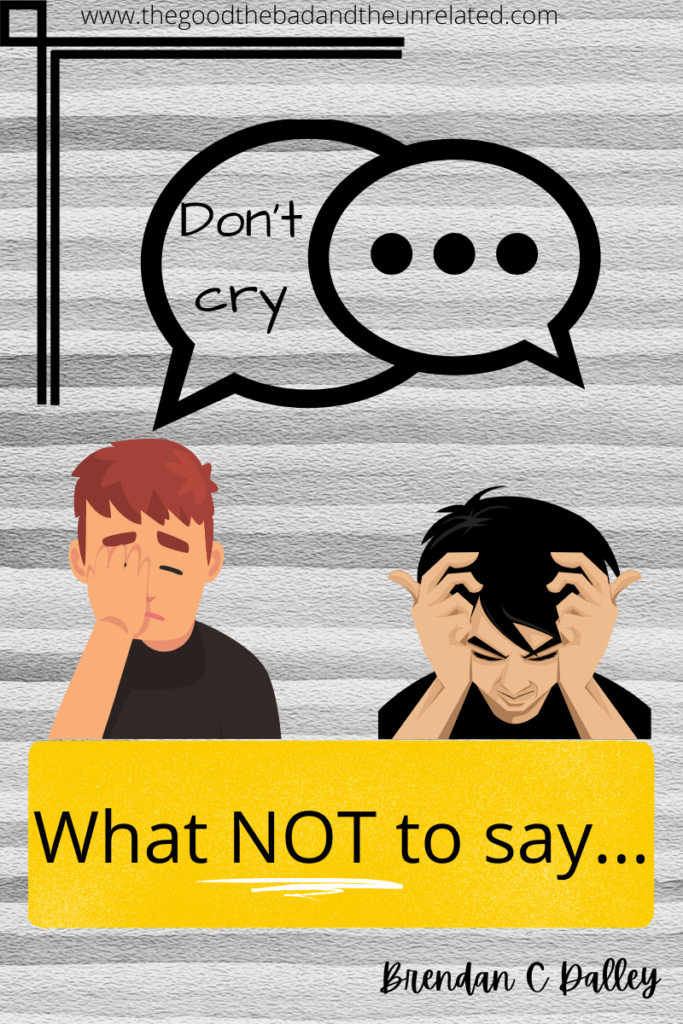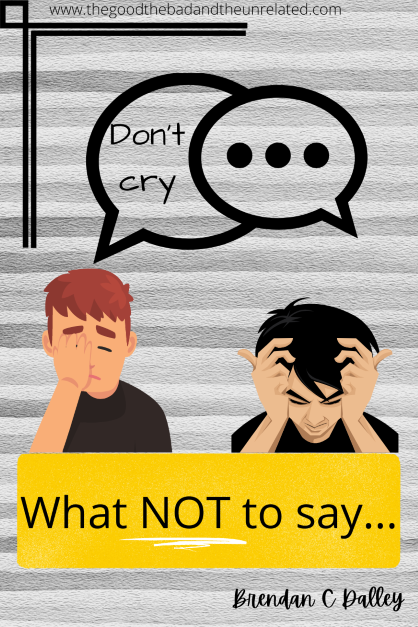Dumb things- Good intentions
I’ve said some dumb things in my time. I may not have asked a largish woman how long till the baby is due, but I’ve dropped some clangers that left the room stunned and silent. We all do it occasionally, and we’ve all had it done to us. My mate often has hotel receptionists mistake him for his wife on the phone. To a person, each receptionist is terribly embarrassed when the truth is revealed. Despite the hilarity that saying something dumb sometimes brings, there are some things we say with good intentions that are quite unhelpful. There are some phrases we should avoid, particularly in emotional circumstances. Here then are a few things not to say …
Mere animals couldn’t possibly manage to act like this. You need to be a human being to act really stupid.
Terry Pratchett
I never liked her anyway…
Take it from experience, saying “I never liked her anyway’ just after a friend has broken up with their partner, married or otherwise, is never a supportive thing. Whether they ended the relationship or not, your friend will be either missing that person, or feeling like an idiot for wasting years on them. The revelation that you knew their ex was a tartan wearing, covert stamp collector and didn’t say anything, will only hurt them and your friendship.
The best option is to express as much genuine sadness as you can and offer practical support. Chances are that, in the words of George Costanza, the first breakup ‘won’t take’ anyway and you’ll be left with egg on your face. Better to just be a shoulder to cry on and point them in the right direction. Leave the counselling to counsellors.
Don’t cry…
Those who do not weep, do not see.
Victor Hugo
Our socially connected, digitally enhanced presence is cropped within an inch of reality these days. Chances are that you haven’t seen someone crying outside of the home very often, because it’s just not considered cool. If, however, you have been blessed with a true and genuine friend, you have probably seen them cry or even cried with them in private. Whatever the situation, avoid the temptation to say ‘stop crying..’ or ‘It’s not worth crying about…’. The fact is that they are crying for a reason.
Crying is the mind’s way of letting pain, frustration, anger, sadness and disappointment out. If someone you know is crying somewhat unusually, chances are that they need to. The best thing to do is clear a space and put your arm around them till they calm down a bit. Added to this, the notion that ‘big boys and girls don’t cry’ is harmful, misdirected and frankly quite stupid. In fact, many ‘modern’ people report finding it difficult to cry under any circumstances, such is the pressure to always appear under control. As homo sapiens, we were designed with emotions to guide us during intense moments. They help us improve our lives. Don’t avoid crying. It can be quite cathartic.
That’s not worth worrying about…
Telling someone who is overwhelmed with worry about an issue, that ‘it is not worth worrying about’, is not unlike saying ‘You’re an idiot’ to them. The simple fact is that they are worried about it and don’t need your opinion. People are like icebergs and much of what makes them anxious or worried is attached to something deep within. It may seem trivial to us, but to them it is genuinely serious.
Worry is a natural response to perceived stress. We all feel it. When worry drives us to action, it can be valuable. When worry freezes us to the spot, though, it is very unhelpful because it achieves nothing. If someone you know is constantly worrying, the first thing to consider is that they may need a Psychologist to help them with faulty thinking. Secondly, maybe they feel a little overwhelmed and all they need is a plan to get back on top of things. Better to do something practical to assist in fixing the problem than picking faults with their thinking. Again, leave that to the professionals.
Toughen up/ Put on your big boy pants
This is a statement that I particularly dislike. A friend may genuinely need to toughen up emotionally, but to tell them that when things are hard, is arrogant and lacking empathy. There is no way around it. What is being said is that ‘the issue you are struggling with isn’t important and you are being a sook’.
People do have strong emotional reactions to strange things, it is true. They may need to learn some Cognitive Behaviour Therapy techniques to handle problems. That said, what they don’t need is judgemental fairy floss from a friend. The best response if this is all you have to say, is to say nothing at all.
If someone says “I feel…’ then listen.
Whilst not exactly a dumb thing to say, missing clues to someon’s state of mind is easy. When someone reveals how they are feeling in a sentence, then firstly listen and then secondly, believe them. The words are offered to help you understand where your friend is at.
The male cliche is that when we hear a problem, our first response is to try to fix it. Whilst understandable, we should follow the female version of the cliche, which is to listen first. Sometimes when people are emotional, what they need more than anything is validation that their problems are real and to know you are there for them.
Assumptions – The ‘first cousin’ of dumb things
The other mistake we often make is to assume that everyone we are close to feels the same way that we do. Often our mouths can reflect this. This is a significant problem because clearly we don’t always agree. There are as many opinions in the world as there are people. To assume that you know what someone is trying to say before they’ve said it, is both a little frustrating and somewhat off putting.
The problem with assumptions too, is that often when we think we know what someone will say or feel, we stop listening and move into problem solving mode. We offer advice, not based on what our friend should do, but on what we would do. There is a distinction there. People in crisis need to know that they’ve been both heard and understood. In the end, it’s a matter of respect.
Here then, is a solid list to follow when trying to avoid saying dumb things:
- Listen carefully.
- Pause and think.
- Ask open ended verification questions.
- Explicitly offer your unconditional support.
- Ask what help they need and follow through.
- Finally, if appropriate, offer advice…not opinion.
N:B There are some problems that are so serious that they need professional help. Don’t be afraid to admit that you don’t know the answers. Offering advice about circumstances you don’t understand can be dangerous. You can always offer to go with them if that helps.
Links
Choose words that heal » The Good The Bad and The Unrelated
A conversation could change a life | R U OK?



But I do have a tartan tie and have collected stamps?????
You thought we’d forgotten…
Great post, especially what actually to say in such situations.
Thankyou, Nadia.
🤣
Great advice Brendan. One always needs reminding no matter how old we are. 👌
Thanks Sue. Yes, it is always a good thing to remember to be careful with people’s feelings. I’ve said so much off the cuff remarks over the years.
Very good article, thanks Brendan. “It’s not worth crying about” is one I often get from my husband, and it’s really annoying. Talk about invalidating someone’s feelings! He also seems to think that the best response to sadness or any expression of negative feelings is to crack a joke, like all you really need is a good laugh and you’ll feel better. A common one is the Monty Python quote “sentence you to be hanged by the neck until you cheer up”… seriously. What’s wrong with just listening? If you never get ‘heard’, you just learn to bottle it up.
Thanks, Kay. You’ve just reminded me of all the things I could’ve said haha. I must admit, I have been guilty of cracking jokes at inappropriate moments, but I’m learning. So often you don’t need a problem solved, you just need a sympathetic ear.
Sometimes we want to help but we might make things worst by saying what we shouldn’t. Thanks for this beautiful poste
Thanks for your lovely compliment.
Love that you shared these, we sometimes need a reminder of how insensitive we can be. I especially love ‘Don’t cry’ because I believe crying is exactly what they need and definitely shouldn’t be told not to! Thanks!
Thanks, Stephanie. Great minds think alike.
Wow, needed to hear this. This is great even for using mindfulness with children. Thanks for sharing!
Thanks Whitney. Mindfulness is great for children.
Great advice. We really need to be conscious of our words and actions because we don’t know where the other person is coming from.
So true. You never know what is underneath. Thanks for the great observation.
Very thoughtful 🙂